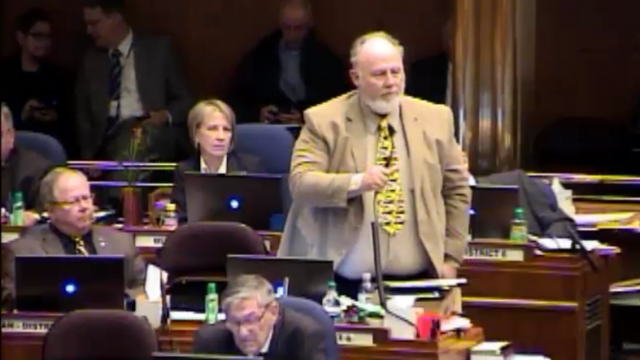House Shoots Down State Rail Inspectors: "Every Derailment Threatens Our Entire Oil Industry"

A House committee removed language in the PSC budget – SB2008 – which would have funded two state rail inspectors and one supervisor to work alongside federal rail safety inspectors. That request was the result of a campaign promise made by Commissioner Julie Fedorchak (read her SAB op/ed on this issue here), but a majority of House lawmakers seem to think the request is duplicative and not worth taxpayer dollars given that railroads are firmly under the jurisdiction of the federal government.
“This is about interstate commerce which North Dakota doesn’t regulate,” House Majority Leader Al Carlson (R-Fargo) said during the floor debate. “My argument would be that the federal government is in charge.”
Democrats, who brought a minority report on the bill to the floor which reinstated the funding for the inspectors, accused Republicans of hypocrisy in ceding this issue to the federal government. “Time and again this body wants state sovereignty but now we want the federal government to inspect our rails,” Rep. Ron Guggisberg (R-Fargo) said. “If we want state sovereignty we need state responsibility.”
[mks_pullquote align=”right” width=”300″ size=”24″ bg_color=”#000000″ txt_color=”#ffffff”]”Every derailment threatens our entire oil industry,” Nelson said, making the point that the negative news coverage of oil train disasters creates an ugly political situation for the oil and rail industries. “Every incident threatens our entire state budget.”[/mks_pullquote]
“Every other budget has cut funding for rail safety,” Guggisberg added. “This is our last chance.”
But ome worried that responsibility might come with liability. “There were concerns in committee about the liability the state would take on in the instance of an incident,” the bill carrier Rep. Roscoe Streyle (R-Minot) told the floor.
Rep. Jeff Delzer (R-Underwood), the chairman of the House Appropriations Committee, questioned whether or not additional state inspectors would really make rails safer suggesting that adding state personnel was more a political solution than a practical one.
“Politically it would be great to say we’re doing all we can for safety,” Delzer said. “But does this increase safety? I don’t think it does.”
Rep. David Monson (R-Onsabrock) pointed out that technology used to detect rail safety issues is “way beyond what another set of eyes can detect.”
So those are the battle lines on this issue. Democrats think adding state inspectors to work with federal inspectors would increase overall rail safety. Republicans think it’s a waste of money that wouldn’t improve rail safety but might invite some liability for rail accidents for the state.
Who has it right? Honestly, I think I’m siding with the Democrats and Commissioner Julie Fedorchak on this one. Two statements made by Democrat lawmakers during the floor debate were especially insightful, I thought.
“We are relying on two federal railroad inspectors to cover the entire state of North Dakota,” Rep. Corey Mock (D-Grand Forks) said. “This is a modest investment in safety.”
He’s right. The cost of adding these inspectors is a little under a million bucks. Which is important to remember when considering Rep. Marvin Nelson (D-Rolla)’s comments. Noting that some communities on the west coast – he mentioned communities in California and Washington – are so concerned about rail safety that they’re working to restrict shipments of oil.
“Every derailment threatens our entire oil industry,” Nelson said, making the point that the negative news coverage of oil train disasters creates an ugly political situation for the oil and rail industries. “Every incident threatens our entire state budget.”
That resonates with me. Would a couple more state inspectors fix the problem with rail derailments? No. Would it help? I’m not sure, but Fedorchak and others seem to think so, and dozens of other states have implemented similar inspectors. This seems a relatively small amount to spend on addressing a big problem.
Still, the House rejected the minority report on SB2008 and moved the budget ahead without funding for the rail inspectors.




